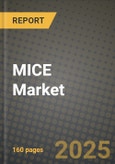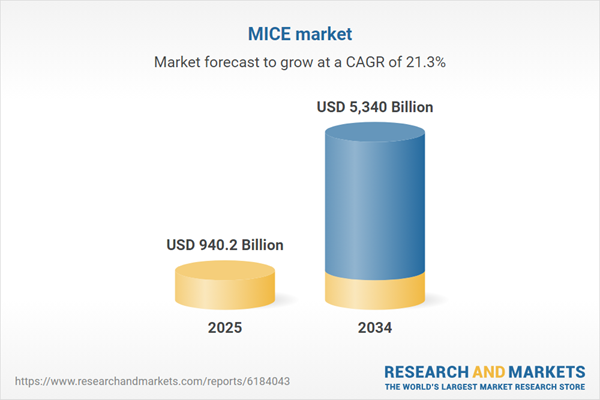MICE market
The MICE industry orchestrates face-to-face and hybrid business events - corporate meetings, incentive travel, association congresses, trade fairs, roadshows, and experiential brand activations - delivering sales pipeline, knowledge exchange, and destination marketing impact. Demand has rebounded with a structural evolution toward omnichannel formats: in-person experiences regain primacy for relationship building, while digital layers extend reach, capture data, and monetize year-round communities. Top end-uses span technology, pharma/biotech, financial and professional services, manufacturing, automotive, energy, and public-sector forums; vertical-specific compliance (e.g., HCP rules) and sustainability frameworks shape program design. Trends include shorter booking windows, portfolio “rightsizing” (fewer but higher-impact flagships plus agile regionals), content modularization for pre/during/post engagement, and measurable outcomes tied to pipeline and learning KPIs. Venue strategies favor flexible spaces, enhanced connectivity, studio-grade AV, and wellness/safety by design. Procurement consolidates with strategic meetings management (SMM), preferred venue/airline programs, and transparent carbon reporting. The competitive landscape blends destination marketing organizations, convention centers, hotels, PCOs/AMCs, DMCs, exhibition organizers, experiential agencies, and event-tech providers. Differentiation hinges on creative storytelling, data/analytics maturity, sustainability credentials (energy, waste, travel optimization), risk management, and the ability to execute at scale across multiple regions. Emerging themes: community-first models that monetize memberships and content libraries; AI-assisted agenda building and matchmaking; carbon-aware travel/event design; and new revenue in “festivalized” B2B experiences that merge learning, expo, and entertainment to drive dwell time and sponsor ROI.MICE market Key Insights
- Omnichannel is default. Flagship in-person events anchor community, while always-on digital touchpoints (webinars, content hubs) sustain engagement and sponsorship between shows - improving lead velocity and retention.
- SMM discipline rises. Enterprises centralize sourcing, budgeting, and risk, standardizing payment, contracting, and sustainability reporting; preferred-supplier ecosystems compress cycle times and reduce leakage.
- Data-driven event design. Registration intent signals, session heatmaps, and badge scans feed dynamic agenda optimization, targeted matchmaking, and exhibitor ROI dashboards that inform renewal pricing.
- Sponsorship reimagined. Packages shift from logo placement to outcome-based assets - curated introductions, hosted-buyer programs, measurement guarantees, and content syndication that extends post-event value.
- Sustainability to specification. Carbon budgets, local sourcing, waste diversion, and venue energy profiles now influence RFP scoring; multimodal travel nudges, menu design, and material reuse become visible attendee touchpoints.
- Compliance and duty of care. Enhanced safety, accessibility, and HCP/financial compliance guardrails are embedded in workflows; scenario planning and contingency inventories protect program continuity.
- Venue as platform. Hybrid-ready venues invest in fiber, broadcast suites, acoustic treatments, and modular staging; hotels differentiate with group inventory control, attrition flexibility, and curated local experiences.
- Incentives go experiential. Reward travel pivots to purpose-led, small-group, high-touch itineraries with wellness and community impact, emphasizing exclusivity, storytelling, and measurable engagement.
- Talent and partners matter. Shortages in production, AV, and logistics elevate integrated agencies and PCOs with global bench strength, standardized playbooks, and 24/7 ops centers.
- Pricing architecture evolves. Dynamic registration tiers, hosted-buyer subsidies, revenue share with partners, and year-round subscriptions diversify income and hedge macro volatility.
MICE market Reginal Analysis
North America
Strong calendar of tech, healthcare, and financial events supports large convention cities and second-tier destinations seeking cost and access advantages. Corporates demand data-rich reporting, inclusive design, and hybrid-capable venues. Incentive travel favors experiential, nature-oriented programs with robust duty-of-care. Union rules, rising labor/AV costs, and compressed lead times shape procurement and contracting.Europe
Dense association circuit and cross-border accessibility underpin stable demand. Sustainability and accessibility standards are stringent; venues score highly on public transit, energy performance, and waste systems. Historic city centers and campus-style facilities compete via hybrid studios and flexible space. Short-haul rail options and carbon reporting influence site selection and sponsorship narratives.Asia-Pacific
Rapid expansion in tech, manufacturing, and life sciences drives mega-shows and hosted-buyer formats. World-class venues in hubs pair with rising second-tier cities offering favorable costs. Visa facilitation, multilingual delivery, and high digital adoption enable sophisticated matchmaking and app-led experiences. Incentives spotlight island and alpine destinations with wellness and premium hospitality.Middle East & Africa
Flagship convention precincts and air connectivity position major hubs for global congresses and exhibitions. Government-backed destination strategies, state-of-the-art venues, and large hospitality capacity support ambitious event scales. Heat-seasonality, cultural programming, and sustainability credentials are managed via indoor innovations and efficient logistics.South & Central America
Regional congresses and corporate kickoffs favor coastal and heritage cities with improving infrastructure. Currency volatility heightens interest in early hedging and local sourcing. Safety, accessibility, and bilingual delivery are table stakes; incentives lean into eco-adventure and gastronomy. Partnerships with local chambers and export agencies help grow exhibitor pipelines.MICE market Segmentation
By Event Type
- Meetings
- Incentives
- Conferences
- Events
Key Market players
Informa, RX (Reed Exhibitions), Comexposium, Messe Frankfurt, GL events, Messe Düsseldorf, Messe München, Koelnmesse, MCH Group, Clarion Events, Hyve Group, Emerald, dmg events, Tarsus Group, CventMICE Market Analytics
The report employs rigorous tools, including Porter’s Five Forces, value chain mapping, and scenario-based modelling, to assess supply-demand dynamics. Cross-sector influences from parent, derived, and substitute markets are evaluated to identify risks and opportunities. Trade and pricing analytics provide an up-to-date view of international flows, including leading exporters, importers, and regional price trends.Macroeconomic indicators, policy frameworks such as carbon pricing and energy security strategies, and evolving consumer behaviour are considered in forecasting scenarios. Recent deal flows, partnerships, and technology innovations are incorporated to assess their impact on future market performance.
MICE Market Competitive Intelligence
The competitive landscape is mapped through proprietary frameworks, profiling leading companies with details on business models, product portfolios, financial performance, and strategic initiatives. Key developments such as mergers & acquisitions, technology collaborations, investment inflows, and regional expansions are analyzed for their competitive impact. The report also identifies emerging players and innovative startups contributing to market disruption.Regional insights highlight the most promising investment destinations, regulatory landscapes, and evolving partnerships across energy and industrial corridors.
Countries Covered
- North America - MICE market data and outlook to 2034
- United States
- Canada
- Mexico
- Europe - MICE market data and outlook to 2034
- Germany
- United Kingdom
- France
- Italy
- Spain
- BeNeLux
- Russia
- Sweden
- Asia-Pacific - MICE market data and outlook to 2034
- China
- Japan
- India
- South Korea
- Australia
- Indonesia
- Malaysia
- Vietnam
- Middle East and Africa - MICE market data and outlook to 2034
- Saudi Arabia
- South Africa
- Iran
- UAE
- Egypt
- South and Central America - MICE market data and outlook to 2034
- Brazil
- Argentina
- Chile
- Peru
Research Methodology
This study combines primary inputs from industry experts across the MICE value chain with secondary data from associations, government publications, trade databases, and company disclosures. Proprietary modeling techniques, including data triangulation, statistical correlation, and scenario planning, are applied to deliver reliable market sizing and forecasting.Key Questions Addressed
- What is the current and forecast market size of the MICE industry at global, regional, and country levels?
- Which types, applications, and technologies present the highest growth potential?
- How are supply chains adapting to geopolitical and economic shocks?
- What role do policy frameworks, trade flows, and sustainability targets play in shaping demand?
- Who are the leading players, and how are their strategies evolving in the face of global uncertainty?
- Which regional “hotspots” and customer segments will outpace the market, and what go-to-market and partnership models best support entry and expansion?
- Where are the most investable opportunities - across technology roadmaps, sustainability-linked innovation, and M&A - and what is the best segment to invest over the next 3-5 years?
Your Key Takeaways from the MICE Market Report
- Global MICE market size and growth projections (CAGR), 2024-2034
- Impact of Russia-Ukraine, Israel-Palestine, and Hamas conflicts on MICE trade, costs, and supply chains
- MICE market size, share, and outlook across 5 regions and 27 countries, 2023-2034
- MICE market size, CAGR, and market share of key products, applications, and end-user verticals, 2023-2034
- Short- and long-term MICE market trends, drivers, restraints, and opportunities
- Porter’s Five Forces analysis, technological developments, and MICE supply chain analysis
- MICE trade analysis, MICE market price analysis, and MICE supply/demand dynamics
- Profiles of 5 leading companies - overview, key strategies, financials, and products
- Latest MICE market news and developments
Additional Support
With the purchase of this report, you will receive:- An updated PDF report and an MS Excel data workbook containing all market tables and figures for easy analysis.
- 7-day post-sale analyst support for clarifications and in-scope supplementary data, ensuring the deliverable aligns precisely with your requirements.
- Complimentary report update to incorporate the latest available data and the impact of recent market developments.
This product will be delivered within 1-3 business days.
Table of Contents
Companies Mentioned
- Informa
- RX (Reed Exhibitions)
- Comexposium
- Messe Frankfurt
- GL events
- Messe Düsseldorf
- Messe München
- Koelnmesse
- MCH Group
- Clarion Events
- Hyve Group
- Emerald
- dmg events
- Tarsus Group
- Cvent
Table Information
| Report Attribute | Details |
|---|---|
| No. of Pages | 160 |
| Published | November 2025 |
| Forecast Period | 2025 - 2034 |
| Estimated Market Value ( USD | $ 940.2 Billion |
| Forecasted Market Value ( USD | $ 5340 Billion |
| Compound Annual Growth Rate | 21.3% |
| Regions Covered | Global |
| No. of Companies Mentioned | 15 |









